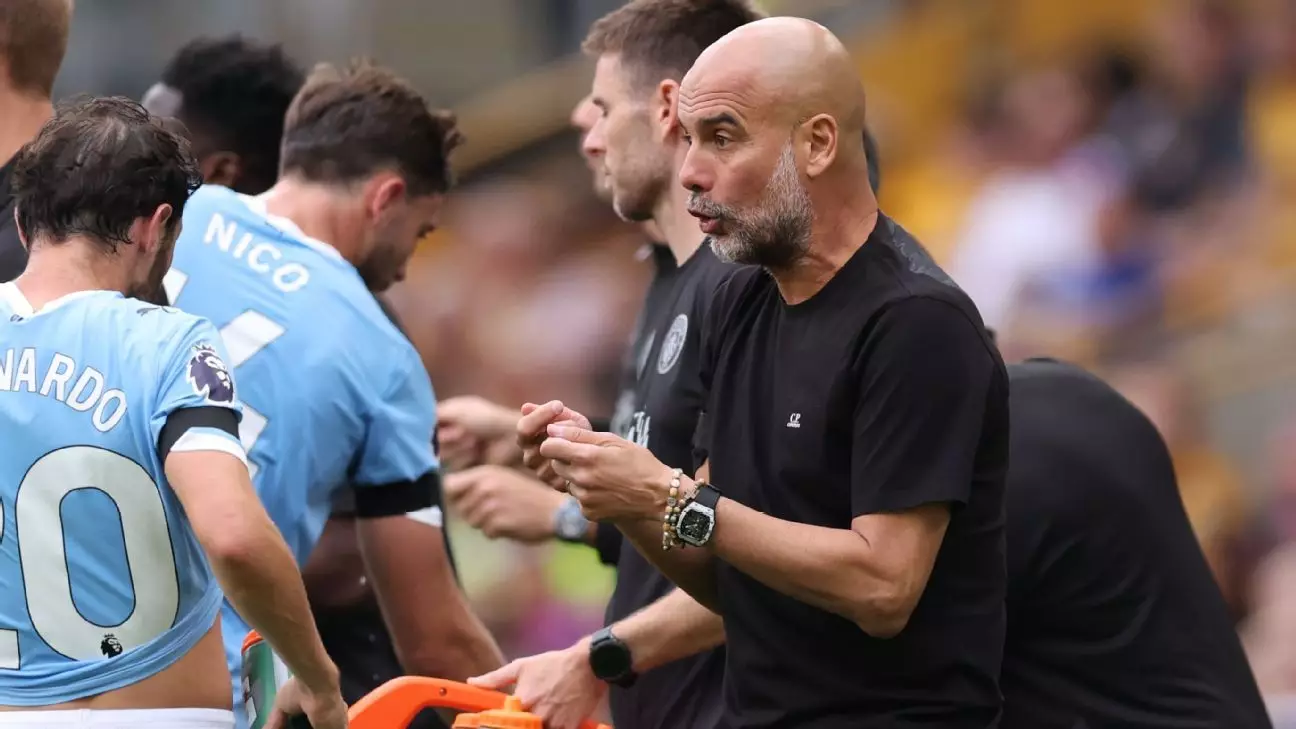Manchester City’s opening game of the Premier League season was undeniably impressive, a 4-0 victory at Wolves demonstrating not only their tactical prowess but also their capability to dominate in a challenging environment. Players like Erling Haaland reaffirmed his status as a consistent goal-scoring machine, while newcomers Tijjani Reijnders and Rayan Cherki showcased their talent, promising a bright future for the reigning champions.
However, amidst this triumph, a more sobering reality emerged—Manchester City’s squad size. Pep Guardiola’s candid critique that “it is not healthy” to maintain such a large roster exposes a nuanced dilemma that could determine whether this season turns into another successful campaign or a distraction ridden with internal friction. While a deep squad is often touted as a strength, Guardiola recognizes that an oversaturated roster can stifle team harmony and fairness, adversely impacting players’ morale and the overall atmosphere.
The strategic challenge lies in balancing squad depth with quality and cohesion. It’s not merely about having enough players to cover injuries and rotations; it’s also about creating an environment where every squad member feels valued and vital. Guardiola’s anticipation of acquiring solutions through player and agent negotiations signals an acute awareness of how internal discord could undermine their ambitions.
The Goalkeeper Conundrum and The Future of Key Players
One of the silent stories swirling around Manchester City is the uncertain future of goalkeeper Ederson. Despite being the indisputable first choice, rumors have persisted suggesting his potential move to Gala, especially with interest from Paris Saint-Germain’s Gianluigi Donnarumma. Guardiola’s emphatic statement that Ederson remains his “number one” reveals both loyalty and the importance of stability in such a critical position. Yet, the fact that these whispers remain persistent highlights the fragility of squad harmony and the difficulty of managing a top-tier team’s internal politics.
Guardiola’s passing reference to Ederson’s illness at the time of the game indicates a level of professionalism and focus, but the broader context raises questions about how long the Brazilian’s status quo can be maintained amid external pressures. His stance that any transfer must align with club terms echoes a broader truth in elite football—players’ movements are ultimately dictated by strategic interests, not just individual desires.
Moreover, the ongoing debate about potential replacements underscores a larger issue: the challenge of maintaining excellence when the backbone of the team faces uncertainty. It reveals Guardiola’s strategic patience and readiness to adapt, but also the persistent tension between loyalty and necessity in squad management.
Strategic Insights and Future Prospects
Guardiola’s reflections on the game emphasize not only the impressive aspects but also the room for growth. His focus on transitions and attacking pace reveals a desire to enhance clarity and execution, especially early in the season when cohesion is still developing. It’s a reminder that even dominant victories contain lessons that can pivot the team toward even higher performance levels.
The emphasis on integrating new signings like Reijnders, who made an immediate impact, indicates a proactive approach to squad building. Guardiola’s optimistic comments about Reijnders’ potential suggest that Manchester City are not content with just a good start; they are ambitiously laying the groundwork for sustained excellence. Yet, underlying these comments is the awareness that internal squad dynamics may indeed be the latent risk holding back their true peak potential.
The speculation surrounding other key players, including goalkeeper Ederson and the club’s interest in Savinho, highlights the fine line between strategic evolution and destabilization. Each transfer window is not just about adding talent but also about orchestrating team chemistry, which in City’s case, might be tipping toward imbalance.
The Human Element Behind the Tactics
Ultimately, this situation underscores a crucial fact about high-performance teams: success is rooted fundamentally in the harmony and mindset of its members. Guardiola’s honesty about the squad’s size, coupled with his commitment to addressing it, underpins the importance of managing not just tactics but human relationships within the club.
The blunt acknowledgment that “it’s not healthy” to have an overly large squad is a rare moment of transparency, showing that even the most successful teams are vulnerable to internal discord. Maintaining a positive, motivated atmosphere requires careful attention—something Guardiola clearly recognizes. As the season progresses, the true test will lie in how effectively Manchester City can streamline their squad without sacrificing depth or morale.
Manchester City’s promising start is accompanied by underlying challenges that demand strategic finesse. Their pursuit of continual dominance hinges not just on talent and tactics but on internally balancing ambition with sustainability. Guardiola’s insight into squad management reveals a coach acutely aware of the fine line between power and peril—an awareness that, if navigated wisely, could make this season another chapter in their storied legacy of excellence.

